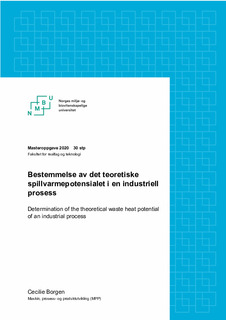Bestemmelse av det teoretiske spillvarmepotensialet i en industriell prosess
Master thesis
Permanent lenke
https://hdl.handle.net/11250/2725446Utgivelsesdato
2020Metadata
Vis full innførselSamlinger
- Master's theses (RealTek) [1722]
Sammendrag
For å begrense klimaendringene som konsekvens av økte klimagassutslipp er det viktig å sikre ansvarlig forbruk og produksjon. Dette innebærer blant annet å redusere energibruk i industriell produksjon. Dette kan gjøres ved å identifisere overskuddsenergi som ikke blir benyttet, og omsette denne til nyttig arbeid, dette kalles spillvarmegjenvinning. Det finnes en rekke ulike teknologier som kan omsette spillvarmeenergi til nyttig arbeid, eller til en energiform med høyere energikvalitet. I denne gradsoppgaven er det undersøkt om det finnes et teoretisk potensiale for spillvarmegjenvinning i en ny prosess i avdelingen kokeriet for bedriften Borregaard. Borregaard foredler grantømmer til ulike biobaserte produkter, og har sitt hovedkontor i Sarpsborg. Resultatene indikerer at det er et teoretisk energipotensiale for spillvarmegjenvinning i den nye prosessen. De mange forenklingene og antagelsene som er gjort i oppgaven gjør resultatene usikre, og i videre arbeid er det derfor anbefalt å gjøre grundigere undersøkelser av det tekniske og økonomiske spillvarmepotensialet med et mer detaljert datasett fra dagens produksjon. To limit the climate changes that happens as a consequence of increased greenhouse gas emissions, it is important to ensure sustainable consumption and production patterns. This amongst other things includes reducing the energy consumption of industrial production. This can be achieved by identifying surplus energy that is not being utilized, and convert this into useful work, this is called waste heat recovery. There are several different technologies available that can convert waste heat energy into useful work, or into a form of energy that is of a higher quality. In this thesis it has been investigated whether there is a theoretical potential for waste heat recovery in a new process in a department called kokeriet for the company Borregaard. Borregaard refines timber of spruce into different biobased products, and has its main office in Sarpsborg. The results indicate that there is a theoretical energy potential for waste heat recovery in the new process. The many simplifications and assumptions made in the calculatins makes the results uncertain, and in future studies it is recommended that there should be made more thorough investigations of the technical and economical waste heat potential with the use of a more detailed dataset from the current production.

